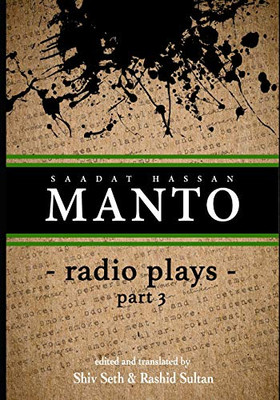

Manto Radio Plays -3 (Ceaseless Rebel)
Independently published
ISBN13:
9781076426284
$17.51
Manto was born as Saadat Hasan Manto in 1912 and died in 1955. He was never a bright student; failed thrice for his matriculation and, ironically, failed in Urdu, his idiom of expression, in all those attempts. He began his writing career as a cadet journalist in a monthly magazine and Baari Alig encouraged him to start translating classics from European languages. Victor Hugo's "Last days of a condemned" was his first attempt. His first story "Tamasha" was published in the same monthly magazine in 1934. In his chequered career, he always struggled financially. The political atmosphere in the country in the 30s and 40s was poisonous for both Muslims and Hindus. The communal riots started both in mainland India and would- be Pakistan. It significantly affected Manto's thinking. Many of his friends and benefactors dissuaded Manto from migrating to Pakistan, a decision that he always regretted. In the maelstrom of communal frenzy, there were many writers of both Hindi and Urdu, who succumbed and wrote stories siding with their respective communities. He remained above the prejudices of religion, caste, and creed. He wrote, what he saw, faithfully. Some critics had suggested that Manto died as a writer when he moved to Pakistan, though many of his classic stories emanated after reaching Pakistan, particularly, those which were written against the backdrop of partition. Manto rightly thought that he was being neglected and was not given the respect that was his due. Secondly, he always felt out of place in Lahore, which he found too stuffing in the new nation being formulated along religious lines as had ever been used to secular environs of pre-partitioned India, no matter how dangerous political atmosphere was. From his Bombay (now Mumbai)'s days in India until Lahore in Pakistan, Manto had become addicted to alcohol. As his resources were limited, that on occasions, he would write a story in a newspaper's office in half an hour and collect money, just enough to buy half a bottle of Rum. What makes Manto significant? "When I read Manto, I always feel that all his contemporaries, including me, am traveling in a bullock cart while he is flying in an airplane above us. He is so much ahead of his times".(Krishan Chander, the legendary writer from the sub-continent)Krishan Chander was reflecting on the themes of Manto's stories, which had never been attempted before by an Indian author. He was charged with obscenity for his stories, at least, three times, because the subject matter he was writing was taboo. Unsurprisingly, all the cases originated in Lahore (now, in Pakistan) where he went and settled after migrating from India. In his lifetime, Manto was accused of provoking sexual perversion. Here a quote from Waris Alvi, a prominent critic, would be not out of place."Sex has been an active theme in many of Manto's stories; but, there is also much more than sex in them. His characters reveal many other traits of their personalities. For example, his stories on prostitutes must not be called erotic stories. However, sex is a necessary part of a prostitute's life, and her profession but Manto's prostitutes are also motherly, selfless, innocent, caring. They are victims of degradation, isolation, and contempt of the society".To persistent criticism that he was indulging in sex, Manto replied that he did not have a "Salle Allah Ki Laundry " where he could wash and rinse human emotions and their actions. His themes for his time were avant-garde. Manto has written good, memorable, enduring, and weak stories. His mediocre stories are, mainly, a product of his desperate desire to buy a half bottle of Rum. When alive, he wrote an epitaph to be engraved on his grave after his death- "Here lies Manto, under mounds of earth. He thinks if he was a greater storyteller or God above." I am told that this epitaph has now been removed, under the pressure of the clergy, as it was considered blasphemous.
- | Author: Saadat Hassan Manto
- | Publisher: Independently published
- | Publication Date: Jun 26, 2019
- | Number of Pages: 240 pages
- | Language: English
- | Binding: Paperback
- | ISBN-10: 107642628X
- | ISBN-13: 9781076426284
- Author:
- Saadat Hassan Manto
- Publisher:
- Independently published
- Publication Date:
- Jun 26, 2019
- Number of pages:
- 240 pages
- Language:
- English
- Binding:
- Paperback
- ISBN-10:
- 107642628X
- ISBN-13:
- 9781076426284





